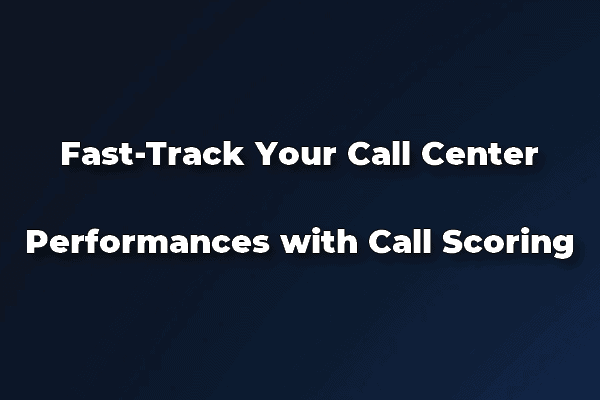The volume of information in the CRM database grows with the passage of time. While the call center can be proud of having richer and more specific information about customers and managing them. Call centers must equally acknowledge that it is becoming increasingly difficult to use this information effectively on a daily basis. To do this, contact centers must simplify, model, and organize information, which is the goal of call scoring.
Scoring is an increasingly popular tool in customer relations, but it is sometimes a little abstract. In this article, we answer the most important questions about call scoring and how they enhance call center performances.
What is Call Center Call Scoring ?
A phone call scoring mechanism assigns a score to calls received at a structure built to handle incoming calls (CRC, simple telephone reception, etc.). The score is used for pre-sales calls and typically indicates or gauges the projected commercial potential of each conversation.
It is therefore used to calculate the individual and average value of calls, as well as to compare the average commercial quality of calls collected from each call source utilized. In this scenario, call scoring works in tandem with a call tracking system.
Call score might be based on “manual” qualifying / classification by agents or on speech analytics algorithms.
The importance of call scoring
For inbound call center call scoring may help call center agents to be more efficient, minimize client turnovers, and increase customer retention.
In terms of outbound campaigns, call scoring assists in discovering the motivators behind qualified leads, case and example, why they choose products or purchases. This enables brands to better understand their marketing efforts on communication channels that provide the highest profit.
The benefits of call scoring for brands and call centers
Even if they are difficult to measure, the benefits of scoring are undeniable. The efficacy of an outbound or inbound campaign may be measured using scoring.
Brands can determine whether or not the people who clicked on an e-mailing campaign truly correspond to the intended audience. They can examine all of the work done prior to the sale using scoring. This is a terrific strategy to keep your advertising approach fresh.
In addition to improving customer relationship management, scoring improves access to information and saves time for the company’s many players, who no longer need to go deep into databases.
A sales team may swiftly identify who should handle which leads and how by utilizing it to qualify the stages of a prospect’s transformation.
The benefits are immediate: the organization simplifies its efforts, saves time, and concentrates its sales spending on the most important prospects. These are sufficient grounds to persuade any hesitant management at first glance.
Call center call scoring : How does It Works?
Call scoring is not only effective for agent performances; it also assists you in identifying and building on your call center strengths. There are numerous tools for scoring calls and the most common ones are:
- Real-time call monitoring
- Call recordings
- Customer Surveys
The manner of call scoring used is primarly determined by the number of agents being monitored. Furthermore, the more comprehensive the call scoring, the better the outcomes and opportunities for performance improvement.
Call scoring entails recording agents’ calls and analyzing talks against a set of predefined criteria. You may listen to talks in real time or afterwards by listening to recorded calls.
Managers may either listen to and assess calls, or engage a quality assurance manager (or team) to do it for you, depending on the size and complexity of your business.
In call scoring, the goals are:
- To identify agents with great skills and tenacity;
- To improve agents’ interactions with customers and improve the overall customer experience;
- To reduce call center errors and lower the call center rate;
- To improve agent efficiency by adding more agents and training them; and
- To boost agent retention and help the company retain clients by retaining top performers.
Call scoring tools work by measuring the conversation topics, the words spoken, and the timing and tempo of agents in relation to one another. Typically, agents are grouped into teams based on their skills, tenacity, customer interaction skills, and quality assurance scores.
The groups are then assigned a conversation score for every call. The score is then analyzed and classified as:
- Up and forward: higher scores indicate agents are more adept at moving the call along the right path; and
- Negatives: lower scores indicate agents are unable to follow through on the right path and will try to push conversations around.
Analysts can also pull up statistics based on the details of the conversation, such as:
- The rate at which customers are chatting with an agent;
- The call length
- Rate at which the customer is resolving issues and answering questions;The rate at which the customer is about to hang up;
- The rate at which the customer is asking the same question or is having an issue;
- The time at which the customer has already hung up on the call; and
- The time of the customer’s last interaction with an agent.
Call score scoring tools can be used with any call monitoring tool. These tools are equipped with all the information needed to convert agents into star performers, save you time and money, and increase your customer’s experience.
Best practices for an effective call scoring
Because not all call centers function in the same way and businesses differ from one another, you must select suitable call scoring systems. You must first choose the Best practices for an effective call scoring.
Call scoring standards assist guarantee that your agents are scored correctly. This also allows you to compare one agent’s characteristics to another, allowing you to identify individuals who may benefit from more training or, at the very least, prevent you from having to prepare a development program.
Real-time metrics & data
Modern call center success is powered by real-time data. Real-time monitoring has several advantages, including making agents’ lives simpler, increasing productivity, decreasing agent turnover, increasing customer happiness, and more.
Agent progress may be readily tracked using real-time information. It can also drive them to enhance their service quality and become more productive agents.
Call Center Agent Training Sessions
By giving continual training to call center agents, the call center may increase their performance. When your agents are well-trained, they can manage the majority of the problem on their own. Consistent training assists your agents in developing their talents and putting them to use.
Acknowledging good agent performances
Agent performance may be improved by praising them for their achievements. They perceive themselves as motivated actors and as productive members of the organization. When agents accomplish something well, it should be shared. As a result, quick feedback may be extremely beneficial to both agents and contact centers.
Call scoring: How to use it to improve agents’ performance?
A call scoring system can help you determine which agents are adding the most value and which need further training. You may also detect inefficient call handling techniques across the board and implement improvements that will improve your operations.
Call handling offers you with detailed insights regarding agent performance, which you may utilize to:
- Determine any issues with your call center agents.
- Improve training for agents that require it.
- Increase agent efficiency.
- Enhance lead quality.
- Enhance your call scripts.
- A higher return on your prospecting efforts ( Call Center R.O.I).
Because the produced score may be used on several campaigns, the development expense is quickly amortized.
Conclusion
Call scoring allows you to accomplish precisely that in the call center sector. You may already understand your agents’ performance by evaluating a few calls. This allows you to highlight the great parts of your team’s work while also improving what can be improved.
They will fulfill client demands, seek to surpass expectations, and give great customer experience in this manner.
Every time you contact with a consumer, your call center’s reputation is on the line. If you want to keep your business expanding, you must ensure that every interaction with your clients is seamless and excellent.
This is where NobelBiz steps in. Not only, we’re the industry’s top pioneer in Contact Center Technology, and we’ve expanded to service Contact Centers all over the world with World-Class Voice Services and Cloud Contact Center Omnichannel solutions. But we are also known as the promise keepers of the call center industry.
We have over 20 years of experience offering comprehensive and personalized solutions to contact centers worldwide. Our telecommunication services and cloud contact center solution can meet the needs of any contact center, regardless of size, industry, or activity (Inbound, Outbound, or Mixed). Our support team provides excellent service and 24/7 assistance. That is why we are known as the industry’s promise keepers.
NobelBiz Omni+, our Cloud Communication Center Solution, can integrate all contact channels (phone, social media, webchat, and SMS) into a single, unified platform. This will ensure that your consumers have a pleasant and memorable customer experience.
NobelBiz voice carrier network is telco solution built on a highly redundant architecture that ensures every call is delivered without interruption, providing you with 99.99% uptime.

Michael McGuire is a contact center industry expert with almost two decades of experience in the space. His experience includes roles as Director of Contact Center Digital Transformation at NobelBiz, and as Director of Operations at FLS Connect, managing multiple call centers. As President of Anomaly Squared and Targeted Metrics, Michael successfully transitioned companies into remote operations and significantly boosted revenues. With a strong background in customer service, leadership, strategic planning, and operations management, Michael excels in driving growth and innovation in the call center space.
Mike is also a proud Board Member for R.E.A.C.H Trade Group, promoting consumer protection and satisfaction and Co-host of the Off Skripted Podcast – a show about Life, Call Centers and everything in between.







